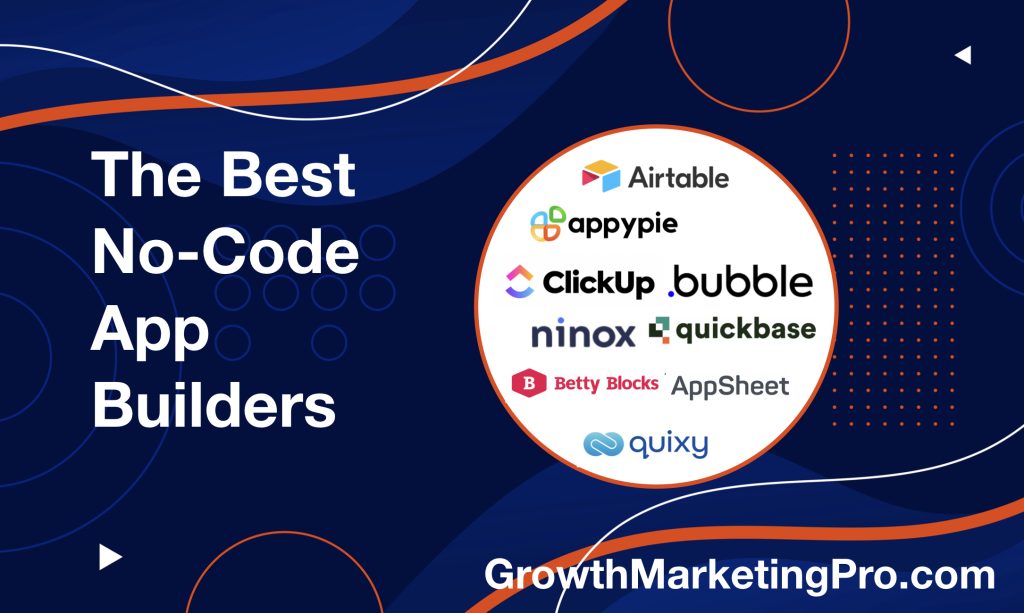Best No-Code Tools for App Development
Creating an app used to mean hiring a developer, learning to code, or investing a significant budget. Now, no-code platforms have changed the game, enabling anyone to build apps quickly and affordably without technical skills. For entrepreneurs, startups, and small businesses, this means you can bring your ideas to life and test them in the market without high upfront costs or complex development.
In this article, I’ll guide you through some of the best no-code tools for app development, each offering unique features to suit different needs. From building web apps to mobile apps and even eCommerce stores, these tools make it easy to create functional, user-friendly applications.
Let’s explore the top options so you can pick the one that fits your project best.
1. Bubble: Best for Custom Web Apps
Bubble is a powerful no-code platform ideal for building fully functional web applications. With Bubble, you can create complex apps with user accounts, databases, and responsive designs. Its drag-and-drop editor makes customization simple, allowing you to build anything from SaaS platforms to social networks without coding.
Bubble’s flexibility is its biggest strength, but it has a slight learning curve for those new to app building. However, if you need an app with dynamic functionality, user interactions, or customized workflows, Bubble is a top choice. It also offers robust backend management, so your data and user info are easy to organize and secure.
For expert help in building your Bubble app, consider working with a no-code agency, which specializes in no-code projects and can help you scale your app efficiently.
2. Adalo: Great for Mobile App Prototypes and MVPs
If you’re looking to build a mobile app, Adalo is a user-friendly platform that lets you create simple, visually appealing apps in no time. Adalo is perfect for building prototypes and Minimum Viable Products (MVPs) as it allows you to test ideas with real users before committing to a full-scale app.
With its visual editor, you can create user logins, list views, forms, and more—all optimized for mobile devices. Adalo also integrates with external data sources, enabling you to pull data from Google Sheets or Airtable to keep your app’s content fresh. While Adalo is best for simpler mobile apps, it’s a great tool for testing ideas and gathering feedback.
If you need a mobile-first platform, explore this guide on the best 6 no-code tools to build mobile apps for additional options.
3. Webflow: Ideal for Custom Websites
Webflow is a no-code platform designed for creating visually stunning websites with custom layouts. Unlike many website builders, Webflow combines design and development, giving you complete control over how your site looks and works. This makes it a favorite for designers who want to build custom websites without coding.
With Webflow, you can create responsive sites, add animations, and even manage CMS-driven content. While it’s not meant for building complex web applications, Webflow is perfect for businesses that want a unique online presence, like portfolios, landing pages, and eCommerce sites. Webflow also offers eCommerce tools, making it a strong choice for retail startups or small businesses looking to set up online stores.
4. Glide: Turn Google Sheets into Mobile Apps
Glide is a no-code platform that allows you to turn Google Sheets into mobile apps. It’s an excellent tool for creating data-driven applications, such as directories, employee management tools, and product catalogs. By using your Google Sheets as a backend, you can keep your app content dynamic and up-to-date without manually updating the app itself.
Glide is easy to use, making it ideal for beginners or businesses that need a simple app for internal use or specific functions. You can customize the look and feel of your app and add features like search bars and forms. While it’s best for basic mobile apps, Glide’s simplicity and quick setup make it highly appealing for smaller projects.
5. Airtable: Perfect for Database-Driven Apps
Airtable is a powerful database tool that combines the functionality of a spreadsheet with that of a database. It’s a go-to platform for entrepreneurs needing a structured way to organize data without technical barriers. Airtable allows you to create custom fields, set up relations between tables, and integrate your app with other tools, like Zapier or Make (formerly Integromat), for enhanced functionality.
Airtable is best for managing data, such as tracking leads, inventory, or tasks. It’s not designed to be a standalone app builder but works well when paired with other platforms for data management and storage. For businesses that need organized data handling, Airtable offers a straightforward, visual approach that’s easy to customize and scale.
6. Shopify: Best for E-Commerce Applications
If you’re building an online store, Shopify is one of the best no-code options available. Shopify provides everything you need to set up a complete eCommerce platform, including product listings, payment processing, and inventory management. It also includes customization options for your store’s design and layout, allowing you to create a shopping experience that matches your brand.
Shopify’s biggest advantage is its simplicity, allowing you to start selling quickly without needing technical expertise. With access to countless plugins and integrations, you can extend your store’s functionality to include customer reviews, email marketing, and more. Shopify is ideal for entrepreneurs focused on retail and wanting to get to market fast with a fully functional store.
7. Thunkable: Great for Interactive Mobile Apps
Thunkable is a no-code platform focused on building interactive mobile apps, particularly suited for Android and iOS. It offers drag-and-drop components, like buttons, maps, and animations, allowing you to create visually engaging and functional apps. Thunkable’s interface makes it easy to add complex functionality, making it a good choice for building educational or game-style apps.
With Thunkable, you can also connect APIs and integrate third-party services to enhance app functionality. If you’re aiming for an interactive experience, Thunkable is a top choice in the no-code mobile space, especially for small businesses or solo entrepreneurs looking to create unique, engaging apps for mobile users.
8. Notion: Best for Internal Business Tools and Project Management
Notion is a versatile tool that many businesses use for productivity, collaboration, and project management. It’s not a traditional app builder but is excellent for creating internal tools to help teams stay organized. With Notion, you can create custom databases, set up project boards, track tasks, and share information across teams.
Notion is especially popular for creating knowledge bases, as it allows you to store and categorize information in a highly accessible way. If you’re looking for a way to organize your business’s resources, Notion is an ideal platform for building an internal tool that keeps your team on the same page.
For ideas on setting up custom resource hubs using no-code, check out this guide on using no-code apps to create resource hubs.
Conclusion
No-code tools offer a wide range of features and capabilities, making it possible to build almost any type of app without technical knowledge. From robust web apps with Bubble to mobile prototypes with Adalo, each platform brings something unique to the table. Choosing the right no-code tool depends on your goals, whether you need an eCommerce store, a data management app, or an interactive mobile experience.
For businesses ready to jump into app development, no-code makes it accessible and affordable. And if you need help along the way, a no-code agency can provide support, guidance, and expertise to ensure your project succeeds. Embracing no-code can open up new possibilities for your business, allowing you to innovate, test, and grow faster than ever.
This guide provides a comprehensive look at the best no-code tools available, helping you find the perfect fit for your app development needs and budget








